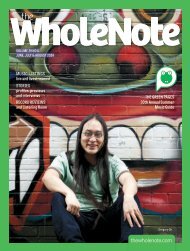Volume 28 Issue 4 | February - March 2023
Volume 28 no.4, covering Feb, March and into early April '23! David Olds remembers composer John Beckwith; Andrew Timar reflects on the life and times of artistic polymath Michael Snow; Mezzo Emily Fons, in town for Figaro, on trouser roles, the life of a mezzo-soprano on the road and more; Colin Story on the Soft-Seat beat; tracks from 22 new recordings added to our Listening Room. All this and more.
Volume 28 no.4, covering Feb, March and into early April '23! David Olds remembers composer John Beckwith; Andrew Timar reflects on the life and times of artistic polymath Michael Snow; Mezzo Emily Fons, in town for Figaro, on trouser roles, the life of a mezzo-soprano on the road and more; Colin Story on the Soft-Seat beat; tracks from 22 new recordings added to our Listening Room. All this and more.
You also want an ePaper? Increase the reach of your titles
YUMPU automatically turns print PDFs into web optimized ePapers that Google loves.
work of Vivaldi himself – unlike his music, they are considered to be<br />
derivative and not of the highest quality.<br />
The poems refer to not only bucolic details like the murmuring breezes<br />
of spring or the songs and dances of fall festivals, but also the shooting of<br />
guns and the barking of dogs. (As I sit writing this, the lines in “Winter”<br />
(L’inverno) describing “nevi algenti” (freezing snow) and “orrido vento”<br />
(horrible wind) speak to me most directly.) Vivaldi himself was, of course,<br />
a highly skilled violinist and he had already forged many elements of the<br />
style we hear here in his previous violin concerti published as Opus 3,<br />
but even in Vivaldi’s time and place the first concerto, “Spring” (La<br />
Primavera) was particularly admired, and it became a popular showpiece<br />
throughout the 18th century and all over Europe.<br />
On the record<br />
As with all classic works, opinions are divided on which recording<br />
of The Four Seasons is best, but with so many to choose from there<br />
really is something for everyone — and who dares say which one is<br />
more authentic, if I may use that loaded term, or comes closest to<br />
expressing Vivaldi’s vision. The historical-performance movement of<br />
the last few decades has been divisive for both players and listeners<br />
with some claiming it has freed us, others suggesting it fetters. It<br />
has, however, reminded us more forcefully of the merely contingent<br />
authority held by any score (as Henry Kingsbury put it) and the role<br />
that oral tradition plays in the performance of music from any period.<br />
After all, in the 17th century this was new music; meant to “move<br />
the affects,” to provoke, excite and challenge its listeners. The<br />
performer was a partner with the composer as is the case in all music<br />
with an improvisatory element. Playing this music still “takes an act<br />
of imagination because the scores leave so many choices open to the<br />
players,” as Giovanni Antonini of Il Giardino Armonico has pointed<br />
out. His ensemble’s 1993 recording with Enrico Onofri caused a stir<br />
when it was released, and I still remember the excitement we all felt<br />
at hearing the liberties he took with tempi and the way they attacked<br />
From Tafelmuisik’s 2014 Four Seasons: Cycle of the Sun: (l to r)<br />
Inuit throat singers Beatrice Deer and, Sylvia Cloutier; Wen Zhao,<br />
pipa; Jeanne Lamon, violin; and Aruna Narayan Kalle, sarangi.<br />
Christina Mahler, cello, is seated behind the soloists.<br />
some sections almost with abandon. Its verve and physicality offered<br />
a very different interpretation than some of the more sedate performances<br />
we had heard from larger, modern-instrument symphony<br />
orchestras, prompting Alex Ross to write a New Yorker review titled<br />
“Violent Vivaldi.”<br />
Some performances experimented even more: in their 2013 London<br />
concert, The Orchestra of the Age of Enlightenment had their orchestral<br />
musicians interact with dancers on stage in an attempt to bring<br />
the sonnets’ poetic images to life even more tangibly; and on his<br />
recording Recomposed by Max Richter: Vivaldi – The Four Seasons,<br />
Richter responded to the original Vivaldi concerti with his own<br />
2022-<strong>2023</strong> Season: A Golden Anniversary Celebration<br />
CANTICUM<br />
CANTICORUM<br />
MARCH 10 & 11 AT 8PM<br />
A Concert by Canticum Trombonorum<br />
The most poetic book of the Bible, Song of Songs (or Song of<br />
Solomon) is in fact a dialogue between two lovers. Canticum<br />
Canticorum follows the journey of these famed lovers,<br />
through spoken excerpts from each chapter, motets set<br />
by late-Renaissance and early-baroque Italian composers,<br />
instrumental interludes, and exploring the different possible<br />
combinations of two trombones, organ, and a high voice.<br />
Tickets starting at only $20<br />
TRINITY-ST. PAUL’S CENTRE, 427 BLOOR ST WEST<br />
Buy Tickets at TorontoConsort.org<br />
thewholenote.com <strong>February</strong> & <strong>March</strong>, <strong>2023</strong> | 23

















